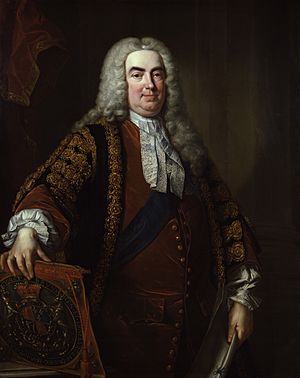Walpole ministry facts for kids
The Walpole ministry was the government of Great Britain led by Sir Robert Walpole. He was a very important politician from the Whig party. This government was in charge from 1730 until 1742, when Sir Robert Walpole left his position. During this time, he was seen as the first true Prime Minister of Great Britain.
Contents
Sir Robert Walpole's Government
A "ministry" is like a team of top government officials who work together to run a country. Sir Robert Walpole's ministry was one of the longest-serving governments in British history. It helped shape how the British government works even today.
Who Was Sir Robert Walpole?
Sir Robert Walpole was a powerful and skilled politician. He was born in 1676 and became a Member of Parliament (MP) in 1701. He rose through the ranks of the Whig party, which was one of the two main political groups in Britain at the time. Walpole was known for his ability to manage the country's money and keep peace.
What is a Prime Minister?
The term "Prime Minister" wasn't officially used back then, but Sir Robert Walpole acted like one. He was the First Lord of the Treasury, which meant he was in charge of the country's money and economy. He also led the House of Commons, which is where elected representatives make laws. He was the main leader of the government.
Key People in Walpole's Team
Sir Robert Walpole worked with many important people in his government. Here are some of the main roles and who held them:
- First Lord of the Treasury and Chancellor of the Exchequer: This was Sir Robert Walpole himself. He was in charge of the country's finances.
- Secretary of State for the Southern Department: The Duke of Newcastle held this role. He handled relations with southern European countries and the American colonies.
- Secretary of State for the Northern Department: The Lord Harrington was in charge of relations with northern European countries.
- Lord Chancellor: This person was the head of the judicial system. Over the years, this role was held by The Lord King, The Lord Talbot, and The Lord Hardwicke.
- Lord President of the Council: This person advised the King. The Earl of Wilmington held this position for most of Walpole's time.
- First Lord of the Admiralty: This person was in charge of the Royal Navy. Sir Charles Wager held this important role for many years.
Important Events During This Time
During Walpole's time as leader, Britain mostly enjoyed peace and economic stability. He tried to avoid wars and focus on trade. However, his government did face challenges, including:
- Elections: There were general elections in 1734 and 1741 where people voted for their representatives.
- Challenges to his leadership: Towards the end of his time, Walpole faced more opposition. In 1742, there was a vote of no confidence in his government, which meant many people in Parliament no longer supported him. This led to his resignation.
Sir Robert Walpole's ministry was a significant period in British history, setting many precedents for how governments would operate in the future.
See also
- 1734 British general election
- 1741 British general election
- 1742 vote of no confidence in the Walpole ministry
 | George Robert Carruthers |
 | Patricia Bath |
 | Jan Ernst Matzeliger |
 | Alexander Miles |


